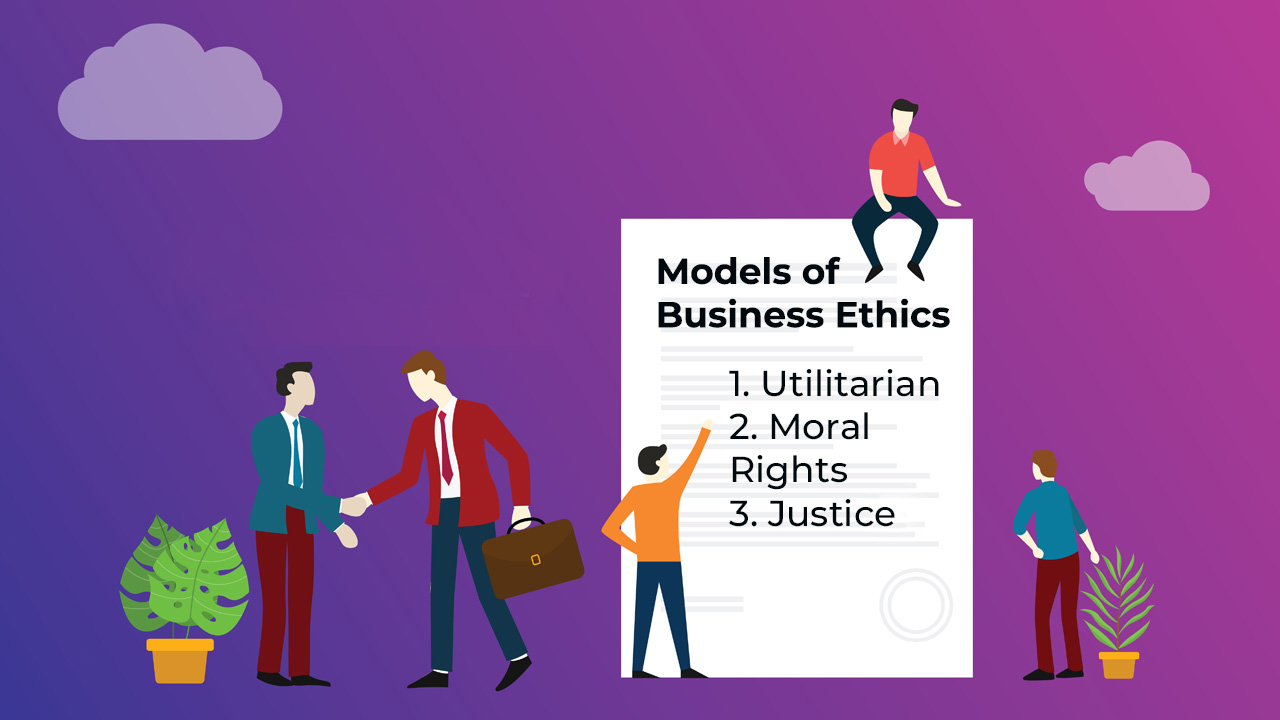Organizations often face ethical dilemmas. Such situations are often complex and exhausting because there is often no one right answer. World-renowned philosophers have spent decades trying to specify the criteria for ethical decision-making. In this article, we will explore three models of business ethics.
Contents
The Utilitarian Model of Business Ethics
This model is based on the economic principle of utility maximization. An ethical decision is one that produces the greatest good to the greatest number of people. Usually, organizations seek to maximize the utility of their primary and important stakeholders. For instance, organizations are more likely to make decisions that please investors as compared to those that favor the local community.
This model of business ethics states that managers must assess the impact of their decision on all relevant stakeholders. The detailed cost-benefit analysis must be conducted. Next, the impact of the decision on all possible stakeholders must be analyzed. Finally, the decision that will lead to the maximum utility for maximum people should be retained.
While it is easy to decide who the stakeholders of the organization are, it is often cumbersome to assess their relative importance. For instance, companies may know that investors are more important than the local community. However, how do they decide whether the relative importance of employees, customers, and workers? It seems to be a new decision dilemma altogether!
Moral Rights Model of Business Ethics
This model of business ethics is based on the principles of doing what is morally right. Hence, it poses challenges like defining what is morally right. For instance, it is difficult to assess whether building a factory in a rural area is morally right. On one hand, it would boost the local economy and improve the standard of living of the local community. However, on the other hand, it would cause pollution and pose health risks to the rural folks. In addition, it would destroy the local flora and fauna.
As per this model of business ethics, managers must assess the consequences of the decision on the lives of the people concerned. Mostly, they consider human rights, like the right to speech, freedom, privacy, and safety.
Although it sounds easy on paper, in practice applying this model may lead to more dilemmas. For instance, companies like Google and Facebook have access to a lot of private information about their customers. On one hand, the privacy of data is the right of customers. However, on the other hand, the analysis of such data could lead to important and ground-breaking research in the social sciences. Similarly, many organizations have to make the choice of exploiting their workers to attain more profit.
The Justice Model
This model of business ethics focuses on the equal distribution of benefits and harms of a decision on all stakeholders. Equity and fairness are crucial in this model. This is because all rewards are supposed to be distributed in an equitable manner. In other words, individuals who have contributed more should get a greater share of the pie.
Managers, being human beings are likely to have biases. Managers are susceptible to make errors in deciding relative contributions. Gender, racial, ethnic, and religious discrimination often color decision-making. In addition, it is often impossible to decide who contributed more and to what extent. Hence, several problems may arise. Often such decision-making is not equitable and it favors one party far too much. For instance, women workers often get much less wage as compared to male workers. Additionally, capital investors get a greater share than managerial employees.
Which is the best model?
It is difficult to state which model is the best. A lot of circumstantial issues need to be considered. In general, managers must answer three questions before making a decision:
- Is my decision consistent with the accepted values and standards of the organization?
- Am I willing to communicate my decision clearly to all stakeholders?
- Would my friends and family approve of my decision?
If the answer to all three questions is yes, it is an ethical decision.
In addition, managers may choose the model based on the situation at hand. While deciding compensation and appraisals, the justice model is more important than the other two models. When the decision is about paying compensation to an injured worker, they should follow the moral rights model. Hence, the models of business ethics cannot be understood outside the real situation. In many cases, managers may find it possible to use all three models of business ethics together. For instance, whether or not they should set up a new manufacturing unit in a rural, flora-fauna-rich area.
What are your thoughts on making ethical decisions? Let us know in the comment section. You may also want to read a curated list of quotes on business ethics on our website.
